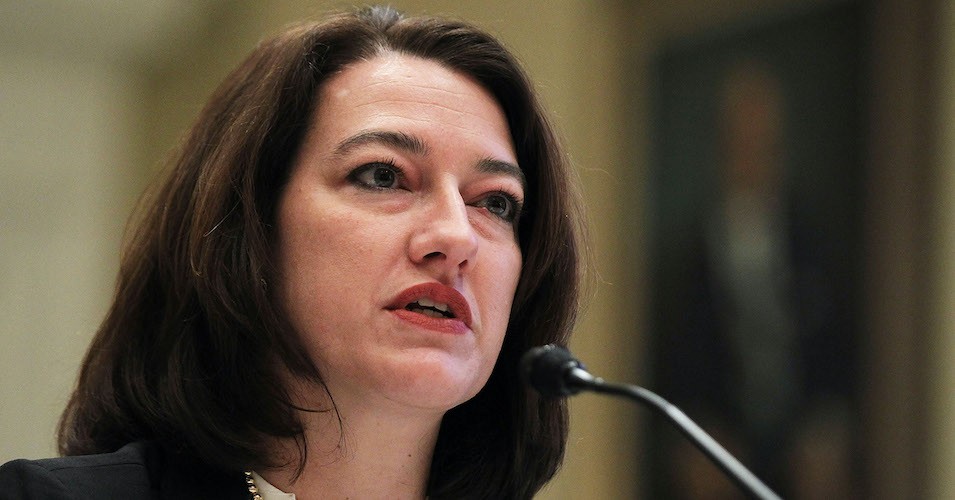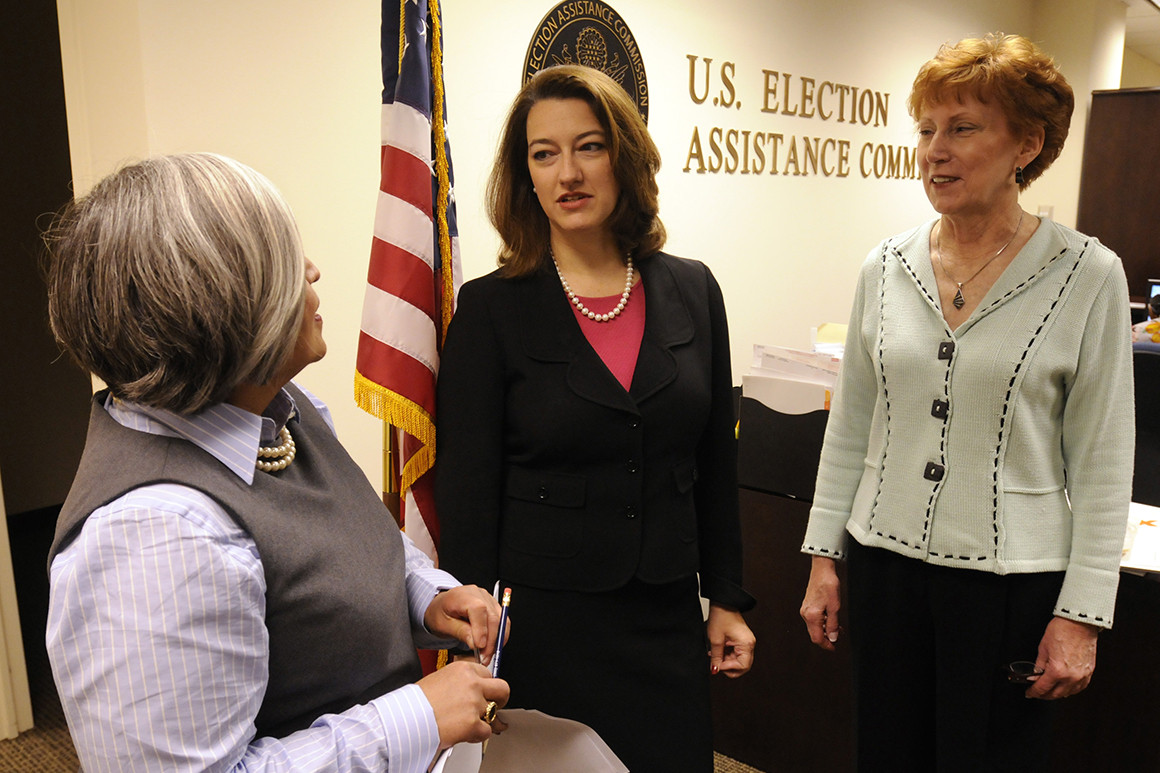FEC: Federal Election Commission. The Federal Election Commission (FEC) is an independent regulatory agency whose purpose is to enforce campaign finance law in United States federal elections. Created in 1974 through amendments to the Federal Election Campaign Act, the commission describes its duties as "to disclose campaign finance information, to enforce the provisions of the law such as the limits and prohibitions on contributions, and to oversee the public funding of Presidential elections."

Caroline Hunter testifies during a hearing before the Elections Subcommittee of House Committee on House Administration November 3, 2011.
[Image source. Click image to open in new window.]
After 10 months, the Federal Elections Commission in May 2020 regained a quorum with the confirmation of Republican appointee Trey Trainor -- and promptly lost it just over five weeks later on Friday [2020-06-26] when commissioner Caroline Hunter resigned to join the Koch-funded group -- Stand Together -- leaving the regulatory body again essentially powerless as the November general election draws closer.
"The FEC's brief period of functioning appears to be over," tweeted Public Integrity reporter Carrie Levine.
No more quorum for the FEC: Commissioner Caroline Hunter is leaving to
join Koch-funded Stand Together, @dlippman reports
https://t.co/Cqj7pbmwWc
-- Maggie Severns (@MaggieSeverns) June 26, 2020
Hunter's last day is July 3 2020.
"Republican FEC commissioner leaving to joining the Koch network's dark money fundraising apparatus," tweeted Dig Left researcher Andrew Perez. "Says a lot!"
In a statement reacting to the resignation, Rep. Zoe Lofgren (D-Calif.), the chair of the Committee on House Administration, said the news "makes abundantly clear the shortsightedness of the Senate Majority's naked partisanship in abandoning a longstanding tradition of confirming bipartisan pairs of Commissioners."
"The FEC just emerged from a nine-month period without a quorum -- the longest running period of the commission's history -- during which it was hamstrung from doing its job," said Lofgren. "Upon commissioner Hunter's announced departure on July 3 2020, the FEC will lose its quorum again for the third time since the commission's establishment, with just four months to go before November [2020]'s general election."
In confirming only a single, Republican nominee to the FEC last month,
the Senate Majority failed to ensure a lasting quorum, enabling a single
Commissioner's departure to grind much of the Commission's work to a
halt once again.
Full statement here: https://t.co/C65ZEcgEhL
-- Committee on House Admn. Democrats (@HouseAdm_Dems) June 26, 2020
The news comes after a year of missed opportunities to keep the lights on at the organization for more than a few weeks at a time. As Common Dreams reported in August 2019, the resignation of vice chairman Matthew Petersen left the panel unable to effectively function; by January elections advocates were clamoring for a full slate of commissioners to be appointed ahead of the general election.
Friday's [2020-06-26] news prompted more criticism of the body. "A huge majority of voters are concerned about the enforcement of our campaign finance laws," Campaign Legal Center President Trevor Potter said in a statement, "and Hunter's resignation leaves their democratic elections with significantly less government oversight."
As Politico explained, the departure of Hunter leaves the panel again unable to enforce rules or take action:
Without four commissioners, the FEC, which is supposed to have six commissioners, is functionally unable to address complaints alleging campaign finance law violations. That meant that at the end of March, there were more than 300 pending cases that hadn't been addressed, including about three dozen that alleged foreign interference.
News of Hunter's resignation was met with frustration and disappointment by elections advocates who decried the lack of urgency in ensuring the board operates as the 2020 contest heats up.
"It is deeply disheartening and concerning that the FEC will again be missing in action," Meredith McGehee, Issue One executive director, told The Fulcrum. "The American people need a watchdog devoted to enforcing the anti-corruption laws on the books and ensuring transparency of the billions of dollars being spent to influence their votes."
Fresh FEC resignation means the campaign finance watchdog may have
no bark at all before the election: https://t.co/qYJKQgHSKu
-- David Hawkings (@davidhawkings) June 26, 2020
The Campaign Legal Center's President Trevor Potter agreed. "Americans understand that the campaign finance system correlates directly to their families' quality of life," said Potter. "The corruption of our democracy by unprecedented amounts of money in our elections from wealthy special interests diminishes the voices of average citizens."
"A strong and functional FEC is vital to protecting our democracy, fighting corruption, and holding politicians accountable for the campaign money they receive," he added.
The White House announced in response to Hunter's departure that President Donald Trump will appoint Allen Dickerson, legal director at the Institute for Free Speech, a right-wing think tank devoted to removing barriers to unlimited campaign spending by outside groups and dark money organizations.
FEC losing quorum again after Caroline Hunter resigns
The federal government's elections watchdog just reestablished a quorum last month [2020-05]
SOURCE: Politico.com, 2020-06-26
FEC: Federal Election Commission. The Federal Election Commission (FEC) is an independent regulatory agency whose purpose is to enforce campaign finance law in United States federal elections. Created in 1974 through amendments to the Federal Election Campaign Act, the commission describes its duties as "to disclose campaign finance information, to enforce the provisions of the law such as the limits and prohibitions on contributions, and to oversee the public funding of Presidential elections."

Caroline Hunter, center, urged President Donald Trump to nominate new commissioners who respect the First Amendment.
[Image source. Click image to open in new window.]
The Federal Election Commission is losing its short-lived quorum after Caroline Hunter, a longtime Republican commissioner of the FEC and former chair of the agency, is resigning, according to a resignation letter obtained by POLITICO. Her departure from the agency means that the FEC will be unable to make major enforcement actions.
After almost a year of not having enough commissioners, the FEC had only just regained its quorum last month when the Senate confirmed Texas election attorney Trey Trainor on a party line vote to fill an empty seat on the nation's campaign finance watchdog. Last week, the FEC had its first meeting after Trainor's confirmation, during which it approved only three advisory opinions on minor issues.
Without four commissioners, the FEC, which is supposed to have six commissioners, is functionally unable to address complaints alleging campaign finance law violations. That meant that at the end of March, there were more than 300 pending cases that hadn't been addressed, including about three dozen that alleged foreign interference.
Hunter will leave the agency on July 3 2020 and said in her letter that she fought against "unnecessary government regulations and unfair enforcement actions" and promoted the FEC being more transparent. During the Citizens United era, which has been marked by an explosion in campaign spending and super PACs pumping cash into elections, Hunter often opposed limits on such activity.
"I fought to protect Americans' First Amendment rights to free speech and association, and to administer the laws as written by Congress and interpreted by the courts, rather than as some wished them to be," she wrote.
She also urged Trump to nominate new commissioners who respect the First Amendment and said the FEC would "benefit greatly from new faces and fresh perspectives."
Hunter said she is joining the legal team of the Koch-funded group -- Stand Together -- a nonprofit that works on criminal justice reform, education, poverty and addiction issues.
Shortly after Hunter announced her resignation, the White House said that it would nominate Allen Dickerson as a new FEC commissioner. Dickerson is currently Legal Director at the Institute for Free Speech, which broadly takes an anti-regulatory approach to campaign finance.
"It is a tremendous honor to be considered for the FEC. I am grateful for the president's confidence, and hope to have the opportunity to serve the American people in this important role," Dickerson said in a statement circulated by the Institute for Free Speech. Bradley A. Smith, the founder of the Institute for Free Speech and a former Republican chair of the FEC, praised Dickerson's nomination's and called him a "a lawyer's lawyer" in a statement.
However, Dickerson's nomination does not guarantee a speedy confirmation, even with the FEC set to lose its quorum.
Trainor was originally nominated by President Donald Trump in 2017, but his nomination languished in the Senate for years without a hearing. He was subsequently renominated multiple times before getting a hearing in March of this year.
Senate Rules Chair Roy Blunt (R-Mo.) praised Hunter in a statement. "I look forward to working with the White House to quickly fill vacancies on the commission," he said, but did not give any particular details on a timeline to begin the confirmation process.
Hunter, who was appointed by President George W. Bush in 2008, slammed fellow FEC commissioner Ellen Weintraub, an outspoken Democrat with whom she has long tangled, although she didn't single her out by name.
"One Commissioner -- who has served for more than a decade past the expiration of her term -- routinely mischaracterizes disagreements among Commissioners about the law as 'dysfunction,' rather than a natural consequence of the FEC's unique structure, misrepresents the jurisdiction of the agency and deliberately enables outside groups to usurp the Commission's role in litigation and chill protected speech," she wrote. "The American people deserve better."
Asked for comment, Weintraub said: "It's keenly disappointing for the FEC to lose its quorum just a blink of an eye after we regained it. But of course I wish Caroline well in this and all her future endeavors."
"Caroline [Hunter] earned the highest regard among her peers for her solid and professional leadership skills," FEC vice chair Steven T. Walther, an independent who often votes with the Democratic commissioner, said in a statement. "She has been an ardent and effective advocate of her views on campaign finance and the duties of the FEC and a conversation with her invariably led to a better result. Her dedication and sense of humor made her one of the most effective and respected Commissioners."
Hunter, Weintraub and Walter are all serving on long-expired terms. All were originally appointed to the FEC during the second Bush administration, and have been allowed to serve past the expiration of their term because no one has ever been confirmed to replace them.
Democrats were opposed to Trainor's nomination, saying his views on campaign finance made him unsuited for the commission and decrying the fact that his nomination was moved by itself, instead of in a bipartisan pair as has been tradition.
Trainor's nomination made the committee effectively a 2-2 split between Republican and Democratic appointees. Moving a Democratic nominee at the same time would've likely tipped the committee to 3-2 in favor of Democratic appointees.
"This resignation means that the FEC will once again lose its quorum and be unable to hold meetings, promulgate rules, or vote on enforcement matters," Sen. Amy Klobuchar (D-Minn.), the ranking member of the Rules Committee, said in a statement on Hunter's resignation. "This is unacceptable, especially during a presidential election year disrupted by COVID-19 and as foreign adversaries continue their work to influence our political system."
Klobuchar again called for the next round of commissioners to be advanced as a bipartisan pair. Klobuchar said she and Senate Minority Leader Chuck Schumer identified an "immensely qualified Democratic candidate to the White House for consideration, and she has been vetted and cleared, but she has yet to be nominated."
Democratic aides have repeatedly declined to publicly identify the candidate they put forward. Last year, the Center for Public Integrity identified the Democratic candidate as Shana Broussard, an attorney and longtime aide to Walther, and have not disputed CPI's reporting.
Good governance groups across the ideological spectrum have previously called for a full slate of commissioners serving on unexpired terms to be nominated to captain the nation's chief campaign finance watchdog.
Return to Persagen.com

